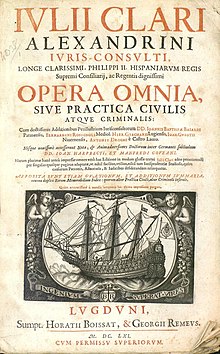|
Giulio Claro
Giulio Claro or Clarus (Italian: [ˈdʒuːljo ˈklaːro]; 6 January 1525 – 13 April 1575) was an Italian Renaissance jurist and public official. LifeGiulio Claro was born in Alessandria of a noble family. He studied at Pavia under Andrea Alciato, and took his doctor's degree in 1550.[1] After receiving his doctorate, Claro was appointed a Milanese Senator by Philip II in 1536, a royal pretor in Cremona in 1560/61, president of the Milanese Magistrato straordinario delle entrate in 1563 and regent of the Consejo d'Italia in Madrid in 1565. WorkClaro's work, together with that of Deciani and Farinacci, provided the theoretical foundation for the common criminal law of Europe. That common law held sway until it was attacked by Enlightenment legal critics such as Feuerbach and replaced by national penal codes in the 19th century. Claro's principal work is the Liber V. Sententiarum, the fifth volume of his legal encyclopedia Sententia receptae. Dedicated to criminal law, it was reprinted as part of the Julii Clari Opera omnia as late as 1737. Editions
ReferencesBibliography
|
||||||||||||||||||||||||||||||
